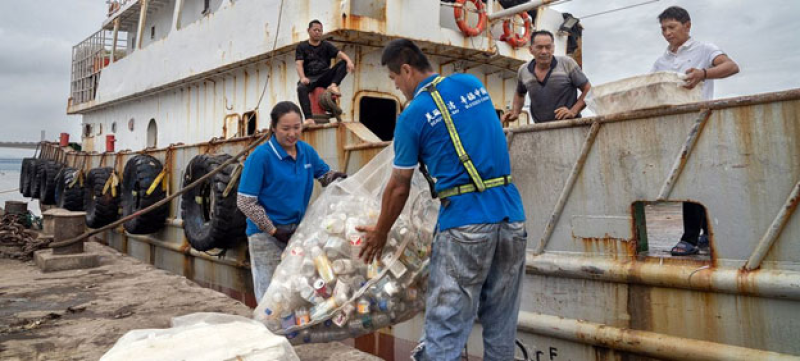- Mystery over deaths of 2 men inside car in Mouchak basemeent |
- Govt Ready to Transfer Power to Elected Leaders: Chief Adviser |
- 40,000 people marooned in Kushtia flood; 13 schools shut |
- Ganga inundates low-lying areas in Rajshahi forcing evacuation |
Are Negotiators Turning the Plastics Treaty into a Death Treaty?

Plastic garbage is offloaded from a fishing boat on the east coast of China.
The future plastics treaty is being promoted as a potential environmental breakthrough. However, in its current form during this week’s negotiations, it contains a dangerous flaw that must be addressed before the final text is agreed upon — or it could undermine the world’s most widely ratified health treaty, the WHO Framework Convention on Tobacco Control (FCTC), effectively enabling the tobacco industry to expand its market under the guise of environmental action.
The cigarette filter, the most littered plastic item on earth, is also the world’s most regulated consumer product, covered by the WHO FCTC. This overlap places it at the centre of both the plastics treaty and the tobacco treaty, demanding alignment between the two.
Yet the current plastics treaty text focuses on alignment clauses for trade agreements rather than health agreements. It promotes Extended Producer Responsibility (EPR), “safe” alternatives, and recycling — none of which are compatible with or permitted for tobacco products.
The WHO recommends an immediate ban on all types of cigarette filters (not just plastic ones), recognizing that no safe alternatives exist for these highly toxic components and that no scalable, safe recycling method is available.
In stark contrast, the plastics treaty text only calls for a “phase-out” until 203x, allowing continued production and marketing. The Conference of the Parties to the FCTC (COP) has also warned that tobacco EPR is a marketing ploy that entrenches industry interference.
Under FCTC Article 2.2, parties must ensure that any subsequent treaties they enter into are compatible with the FCTC — a duty the plastics treaty must uphold.
If these loopholes remain, they will obstruct tobacco control efforts and open doors for tobacco industry interference, costing lives. With 1.3 billion current tobacco users worldwide, even a 1% market increase driven by “eco-filter” marketing or tobacco industry greenwashing could result in 13 million additional smokers and an estimated 6.5 million premature deaths, based on tobacco’s established 50% lifetime mortality rate.
This is also a generational betrayal. On International Youth Day, August 12, 2025, with the theme of empowering youth and building a resilient future, negotiators must ensure the treaty does not do the opposite. If the treaty shields trade but not health, young people will be more exposed to toxic plastics, predatory marketing, and lifelong addiction — all while the industry gains a green veneer.
The problem is fixable. The chair’s text currently grants binding protection to trade agreements, while health treaties receive only soft principles. Although some health exemptions in trade agreements have saved public health measures like plain packaging, it was only after years of costly disputes and delays — time the tobacco industry used to keep selling and misleading.
Without a binding requirement to implement the plastics treaty “in a manner compatible with relevant international health agreements, such as the WHO FCTC,” trade rules will dominate legal interpretation. This would make it harder to defend filter bans from WTO challenges and could legitimise tobacco EPR — despite COP10 warnings that these are marketing ploys that entrench industry interference.
The solution is simple: give health protections the same binding legal status as trade protections. If the treaty can protect trade, it can protect life. Anything less is not a plastics treaty for the planet. It’s a treaty for markets — and, in the case of tobacco, it could cost more lives than it saves.

